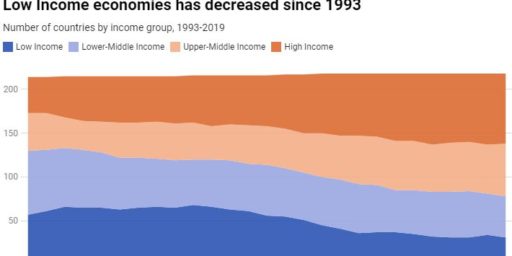Don’t Cut the Benefits for the Rich Says Kevin Drum
No, really. Well at least don’t cut them like Bush is suggesting.
But that’s not all there is to fairness. Most Americans also intuitively accept the idea that tax rates become unfair if they get too high, no matter how rich you are. They also think it’s unfair to pay taxes and get nothing back. A common sense notion of fairness suggests that Social Security should be progressive but not flat. If you pay more in, you get more out.
That’s what we have today, but under the “Pozen plan” that’s the basis of Bush’s proposal, it wouldn’t be for long. The CBPP estimates that by the end of the century, a low income earner would get back 49% of his wages in Social Security benefits, the equivalent of $8,070 today. A high earner would get back only 9%, the equivalent of $8,100 today.
If there’s a contradiction here for liberals, I don’t see it. I support progressive tax rates, but I don’t support 99% marginal rates. I support the minimum wage, but I don’t support a minimum wage that’s 99% of the median. I support progressive Social Security benefits, but I don’t support a program that gives low earners 99% of the benefits of high earners who have paid much more into the system.
In short, Bush’s proposal is bad because it cuts the benefits for the rich by too much which is rather weird since Krugman is arguing that Social Security is a small part of the rich’s retirement income so they’d hardly notice if it was comepletely eliminated.
Still Kevin might be onto something with regards to the unfairness in the system. Samuel Bowles and Herb Gintis have argued on the same grounds why welfare has been in trouble for the past couple of decades. But this is a very strange position for Kevin to take given that he has come out rather strongly in favor of policies that tend to reduce inequality (here is a sample link, link, link, link). Further, Kevin has advocated in the past raising/removing the cap on income that is subject to the payroll tax as a solution to the problems facing Social Security along with benefits reductions. I presume that he’d keep the benefits the same. Thus, there very well might be a contradiction if we raise/remove the cap on income that is taxed on exactly the same grounds: Some people are paying in alot, but not getting enough in benefits. Further, if the benefits reductions are not uniform this too could run afoul of Kevin’s “fairness criterion”, especially so when coupled with an increase/removal of the income cap. Maybe Kevin just can’t get past his dislike for Bush.





This is, of course, largely because it would allow poor workers’ earnings to continue to grow faster than inflation, but not the wealthy workers’ earnings, and thus the poor workers would do better.
Mr. Drum is free to propose a plan that doesn’t cut the benefits of the better off, perhaps by cutting the benefits of the poorer, perhaps by increasing the retirement age. More likely, he’ll go for raising the taxes; it seems to be the only thing that Democrats approve of.
Personally, I like the idea that Social Security should provide a guaranteed minimum income to all, so that seniors who live too long won’t be trapped in poverty. It should be insurance.
If people have more money and want to save for retirement in order to have more than that guaranteed minimum income, they should do it on their own. There’s no need for a government retirement scheme.
Maybe Kevin just can’t get past his dislike for Bush.
And that, IMO, has always been the genius in Bush’s taking on these issues… he has exposed the weakness of the arguments the Democrats have made for decades, now.
It’s like stirring an ant-hill with a stick… Every ant in the colony gets totally confused about what they were doing, and where they were going. Leaderless, they’re fored to think for themselves… and most fail at it. The rest become EX -Democrats.
However, to be fair, this is where Krugman’s point does come in. Once it becomes a minimum guaranteed income that is nearly the same for all, limiting the amount of income taxed by Social Security to $90,000 makes much less sense. It becomes very regressive; perhaps balanced by income tax and others, perhaps not. (I suppose one could view it as an insurance policy of sorts against ending up needing Social Security.)
So I’d favor eliminating the Social Security taxes entirely and folding the whole thing into general revenue and other taxes too as that happens.
Oddly enough this is precisely what have some have argued, but they are also opposed to this kind of change which would, in my view, make Social Security look more like a form of social insurance/saftey net.
I don’t think you get it. The Bush plan would reduce benefits for everyone making over $20K per year.
I don’t think you get it. The Bush plan would reduce benefits for everyone making over $20K per year.
I perfectly well do get it, praktike, and so does he. First off, I believe that Social Security benefits should be high enough so that even people making under $20K per year should not be living in poverty in their retirement and having to eat cat food. Do you disagree? Do you believe that it’s currently happening?
Secondly, current benefits increase for everyone over the rate of inflation. This would reduce the rate to closer to the rate of inflation for those over $20K, and to the rate of inflation for those near the cap.
Thirdly, changing demographics– including an increasing lifespan and decrease in the number of children a woman gives birth to in her lifetime– have made the assumptions of the program no longer work. Some changes must be made, whether higher taxes, reduced benefits, increased retirement age, or a combination. I think that this is the best plan.
I would like a welfare plan that gives all seniors a minimum income so that none are in poverty. I don’t want a forced-savings plan; I don’t see the point. The middle class and wealthy who want a better retirement should be able to save for it on their own. Once it’s a welfare plan, I would like the money to be raised through general revenue instead of a regressive tax like currently.
Oh I got it right away. I read Krugman, Furman, and others on this and noted that number right off the bat. If this is all you have to contribute, thanks for stopping by and being irrelevant. Sheesh.
I think, and this has not been comfirmed, but it seems Krugman and Drum are not the same person, and sometimes think different things.
carpeicthus,
And you win today’s “Stating the Obvious Booby Prize”. Of course they are different people. But what amuses me is how all these whacky justifcations for Bush’s plan are ginned up. It is like watching the Keystone Kops as they fall all over each other trying to show how rotten this plan is even though it isn’t all that different from other plans they have supported or positions they have taken.